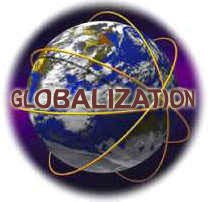Globalization or Protectionism?
 Is globalization an internationalization of opportunities or the creation of reservoirs of endemic poverty which perpetuate a have/have-not scenario?
Is globalization an internationalization of opportunities or the creation of reservoirs of endemic poverty which perpetuate a have/have-not scenario?

If globalization is about creating equal opportunities, distributing wealth or at least creating the conditions for wealth to grow, it is a chimera. If globalization is about squeezing the bottom line, shifting jobs from one place to another, creating unemployment in areas where employment formerly existed and holding other areas down with low wages, so that they cannot develop, this is what we see today.
So this is globalization. A nicely-crafted mechanism, protected by its institutions, keeping the haves rich and the have-nots poor. One such institution is the World Trade Organization, which purports to lay the foundations for free trading opportunities around the globe.
How free? When the richer countries are imposing import duties and providing subsidies for their producers to dump their goods at fictitious prices so that the poorer countries cannot compete, where is the right to equality?
Globalization, we are told, is supposed to be an inter-exchange of cultures in a wondrous diversity of stimuli. What we see is a world which is crying out to be multi-polar, with a self-appointed policeman doing everything it can to create a unipolar approach to crisis management, in a world rent by increasing intolerance and conflict.
Never before has our planet been closer to a conflict between civilizations since the Second World War, never before has there been a wider gap between the haves and the have-nots. By 2050, more than 90% of the world's population will be living in Less Developed Countries, in many cases without enough food to sustain themselves, rendering them wholly dependent upon foreign aid programmes.
Were this aid to be free from political strings, we could talk about a global community of brother-nations helping each other out. But this is not how it works.
The way is works is like this: the developed nations have it all ways when they have a sufficiently small population and sufficiently large areas of arable land to feed themselves, controlling all the time foreign produce through tariffs and subsidies. This dictates to a foreign producer the way in which he operates and if he begins to compete, the carpet is pulled out from under his feet.
Similarly, when a nation is dependent upon foreign aid, political and economic colonization is not a question of if, but when. Food aid programmes are followed by economic aid programmes to pay for it and that means delivering the running of the country to Washington, like a turn-key project.
What we see in our world today is a minute clique of fat cats which spend a trillion dollars a year on weapons systems which live through the globalization of their interests and their interests alone. Otherwise, how to account for the millions who live without having access to drinking water?
This is not globalization. It is manipulative monopolization.
Subscribe to Pravda.Ru Telegram channel, Facebook, RSS!


